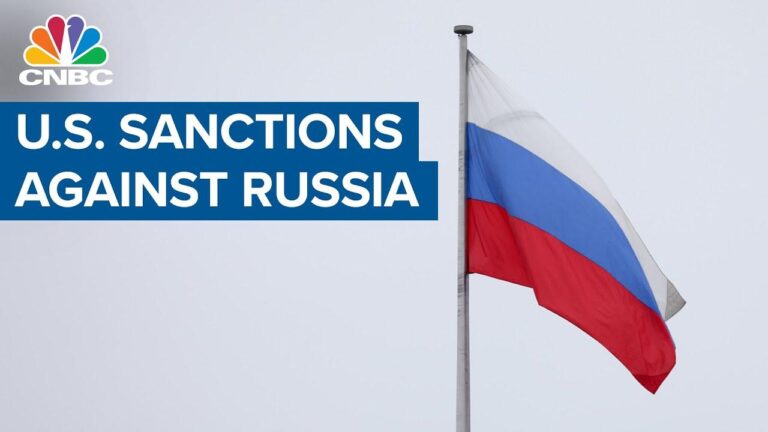In a decisive move aimed at intensifying pressure on Moscow, European leaders have unveiled a new round of sanctions targeting key sectors of the Russian economy. Announced yesterday, these measures come amid escalating tensions over Russia’s actions in Eastern Europe and represent a coordinated effort by the European Union to curtail Moscow’s financial and strategic capabilities. The latest restrictions are expected to have significant implications for trade and energy markets, signaling Europe’s commitment to a firm and unified response.
Europe Targets Key Sectors in Latest Russia Sanctions to Curtail Economic Growth
In a decisive move to curb Moscow’s economic resilience, European authorities have unveiled a fresh package of sanctions targeting critical sectors of the Russian economy. This latest round focuses heavily on limiting Russia’s access to advanced technology, energy resources, and financial services, aiming to squeeze the operational capabilities of key industries that underpin the nation’s economic infrastructure. Notably, restrictions have been imposed on exports of high-tech semiconductors and equipment essential for oil refining, significantly disrupting Russia’s ability to maintain its energy production levels. Additionally, the financial sector is under pressure, with several prominent Russian banks now facing severe curbs on cross-border transactions and access to international capital markets, effectively isolating them from key financial systems in Europe.
These measures come alongside tighter controls on luxury goods and advanced machinery, designed to erode the economic advantages enjoyed by Russia’s elite and industrial conglomerates. The European Union’s strategic approach incorporates:
- Prohibitions on technology exports critical for military and industrial use.
- Sanctions on Russian energy exports to limit revenue streams.
- Comprehensive restrictions on financial institutions to block capital flows.
- Embargoes on luxury goods aimed at diminishing elite privileges.
| Sector | Type of Restriction | Expected Impact |
|---|---|---|
| Technology | Export Ban on Semiconductors | Hinders manufacturing & military tech development |
| Energy | Limits on Refining Equipment | Reduces oil output capacity |
| Finance | Transaction Restrictions | Blocks access to international funds |
| Luxury Goods | Import Embargo | Targets Russian elite consumption |
Diplomatic Repercussions and Global Reactions to Europe’s Intensified Measures
The newly imposed EU sanctions on Russia have sparked a wave of diplomatic responses across the globe, revealing the complex geopolitical landscape surrounding this escalating conflict. Several Eastern European nations have publicly lauded the measures, citing a need for a unified front to curb further aggression. Conversely, some countries in Asia and the Middle East have expressed reservations, worried about the broader economic ramifications. The sanctions target key sectors including finance, energy, and technology, thereby increasing pressure on Moscow’s economic resilience.
Key international reactions include:
- United States: Strongly endorses Europe’s steps, pledges complementary sanctions.
- China: Calls for dialogue and restraint, warns against escalation.
- India: Advocates for balanced diplomacy, cautious about economic fallout.
- Turkey: Emphasizes mediation role, keen on preserving regional stability.
| Country | Official Statement | Implication |
|---|---|---|
| United Kingdom | Supports sanctions; reinforces commitment to collective security | Stronger NATO cohesion |
| Brazil | Calls for peaceful negotiation; wary of sanctions’ impact on global markets | Potential diplomatic balancing act |
| Japan | Aligns with EU sanctions; highlights risk to energy imports | Energy supply vulnerabilities |
Strategic Recommendations for Navigating Sanctions Impact on Energy and Trade Markets
Energy and trade stakeholders must urgently recalibrate their strategies to withstand the expanding scope of sanctions. Diversification of supply chains is paramount; businesses should proactively explore alternative trading partners and energy sources outside the sanctioned regions to mitigate operational disruptions. Embracing renewable energy investments and enhancing energy efficiency measures can also provide long-term stability amid fluctuating fossil fuel supplies. Moreover, close monitoring of regulatory updates and engaging with compliance experts will be critical to navigate the complex sanctions environment without risking legal repercussions.
Organizations should focus on three core pillars to adapt effectively:
- Supply Chain Resilience: Identifying and securing access to non-sanctioned markets to maintain critical flows.
- Financial Clarity: Strengthening due diligence procedures and ensuring transparency in transactions to avoid inadvertent breaches.
- Market Intelligence: Leveraging real-time data analytics to anticipate shifts in commodity pricing and trade routes.
| Strategic Focus | Key Action | Expected Benefit |
|---|---|---|
| Supply Chain | Engage alternative suppliers in Asia and Africa | Reduced dependency on sanctioned regions |
| Compliance | Implement automated sanction screening tools | Minimized risk of regulatory violation |
| Market Intelligence | Deploy real-time data analytics platforms | Improved anticipation of market fluctuations |
To Conclude
As tensions between Europe and Russia continue to escalate, these newly announced sanctions mark a significant step in the West’s ongoing effort to influence Moscow’s actions. While the full impact of these measures remains to be seen, they underscore the increasing resolve of European leaders to respond firmly amid the evolving geopolitical landscape. Stakeholders and observers alike will be watching closely as both sides adjust to these developments in the coming weeks.



